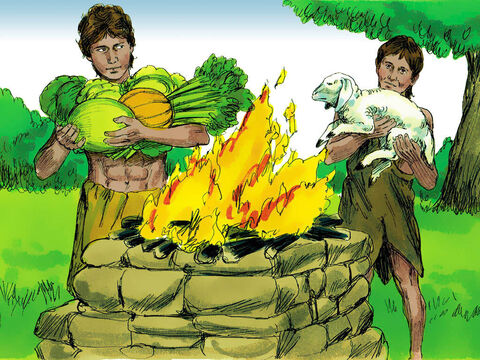Cain & Abel - Biblical Dietary Implication and Tithes
The Bible and its rich tapestry has shaped the way many people live their life today. Rooted in antiquity the knowledge and wisdom within its pages is a conglomerate of scripture attributed inherently as a historical and spiritual collection gathered and purposely designed with layers of meaning- relative to divine guidance for life in mortality and beyond. It offers the opportunity to learn from stories rich in metaphor, allegory with prophetic insights that guides many religions and philosophical perspectives about life’s purpose, reason, and so forth.
Today many people are concerned with the types of food they eat and many look to the bible for dietary guidance. The vast differences between modern diets, the types of food we consume, is an age old question which leaves much to be desired relative to optimal integration with the physical body and its nourishment relative to dietary consumption.
I would like to offer a simple observation relative to dietary implications as a microcosm within the story of Cain & Abel.
Relative to the question regarding Vegetarianism, Pescatarians, Carnivores, and Omnivores I think reflecting upon the story of Cain and Abel may offer an often overlooked perspective that may have dietary insight.
The premise of the story highlights the difference in vocation between the two. Cain was a farmer and Abel was a Shepherd. The story is summarily about God requesting an offering or perhaps even tithing.
Within the confines of their vocation we may assume that Cain was expected to offer the best of his crops and Abel the best of his flock. Without subjugating ourselves to the complex nature and implication of the details of the offerings and its doctrinal implications-I would simply like to highlight an observed perspective regarding dietary implications and murder.
I will conceded that within the context of the story my observation may be mute, yet nevertheless I have found it intriguing.
Within the timeline of the story Cain slays Abel after God had found fault with his offering.
To me beyond the doctrinal significance of the story and its implication relative to the suggestive connotation regarding The Shepherd and its continued significance through the Old Testament and into the New Testament; ultimately ending with the pinnacle of the Atonement- I have always been perplexed by the nature of my personal perspective regarding personal offerings or tithe for God.
Within my humble and rudimentary understanding of divine expectation I am often perplexed when thinking about God’s request towards me as individual and tithes within the scope of the story of Cain and Abel.
As a member of The Church of Jesus Christ of Latter-day Saints I have heard that it may be acceptable or at the very least in times past that members who were farmers or shepherds could give an allotted portion of their harvest or flock in lieu of a financial obligation in sum of tithes to The Lord.
I am not questioning God and the doctrinal facets of the story which is accepted as doctrinally defined by leaders of Thy Church, I am merely offering a personal observation regarding tithes, the implication it has on dietary restrictions, and murder.
Summarily within the construct of the story it may seem to suggest that ultimately Cain’s offering was Abel. By killing Abel, an innocent man, not sanctioned by God, Abel became a blemished sacrifice.
I am suggesting the moral of the story may be linked to offerings or sacrifice to God, to which innocent blood within the context of human-kind, man or woman is not acceptable.
The idealization that Cain a farmer and Abel a Shepherd may imply that God allows for the consumption of meat and vegetables.
In short, relative to being an omnivore and the separation between being a man or animal is that mankind is not to eat of itself. It may seem that beyond moderation there is a fine line that should never be crossed, even, cannibalism.
Relative to murder, God did not give an “eye for an eye.” Which if at the time Mosaic law or its root equivalent was effectual-Why did God not end his life?
I am not certain and my thoughts remain inconclusive regarding the doctrinal implications. Yet, God spared his life, but there were consequences. Ultimately, it was not an “eye for an eye.”

